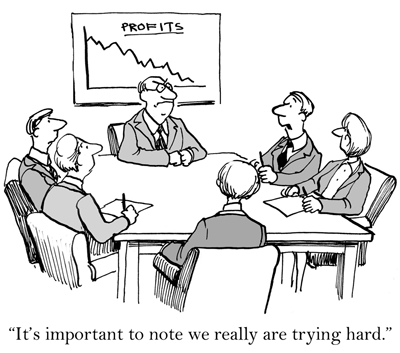Five Common Reasons Why SEO Campaigns Fail
“I tried SEO a couple of years ago—spent thousands of dollars actually—and I’ve got nothing to show for it.”
Me: “What keywords were you trying to rank for?”
“I’m not sure, actually.”
I wish I could tell you that was a conversation I recently had with a unique prospect, but it is an exchange I’ve had dozens of times when meeting fellow business owners. It seems like everyone has either experienced an expensive SEO failure, or knows someone who has.

Indeed, search engine optimization is a technical service that is constantly changing and, unfortunately, filled with people who are better salesman than service providers. But it is possible to find success if you can avoid a number of common traps.
I’ve found that there are a handful of mistakes that show up repeatedly in failed SEO initiatives even when qualified and experienced people are involved.
How many of these have plagued your past efforts?
1. Starting Without Defining Success
With any initiative, beginning with the end in mind is proven to increase your odds of success. However, as this article’s opening conversation shows, many of us blindly charge into new marketing initiatives. In SEO, success typically takes the form of leads, sales, traffic or some other measurable outcome. Once you’ve defined success, you can reverse engineer leading indicators and a project plan.
Ask yourself what keyword rankings are most likely to lead to your desired outcome? That keyword list is a great tool for measuring your progress towards success in SEO.
Success checklist item: Can I define success for my SEO efforts in a measurable way?
2. An Overly Narrow Approach
You can see how important starting with a keyword list from the very beginning is. But a second mistake I find is a business who believes their success is tied to just one or two keywords. The way people search for what you do varies more than you probably realize. Your potential customers are searching for a number of problems that your products and services solve, and a complete keyword strategy is going to include those solutions as well as brand names, descriptor keywords of your products, and common alternatives.
There is a relatively simple, but counterintuitive, concept at play in search engine optimization. We refer to this as the longtail paradox, and it illustrates that the more specific a search term is, the more likely the customer is to buy while simultaneously being easier to rank for.
Success checklist item: Have I generated a robust list of terms that will attract my target customers?
3. Giving Up Too Quickly
Companies often give up on SEO too quickly because they focus on only one or a small handful of keywords as mentioned above. They give it a month, maybe three, and when they haven’t accomplished landslide success, they decide to shift their focus or marketing dollars elsewhere. I like to equate this to working out enough to get sore but not enough to see results—all pain, no gain.
Sticking with any long term plan is much easier when you see progress on a continuous basis. Understanding the activities and other leading indicators that lead to your desired outcomes is a key step in seeing a long term SEO effort through.
Just like hiring a brand new salesperson, you have to be patient for results, but impatient for the right activity.
Success checklist item: Do I understand the leading indicators and activities that will move the needle? Will I review them on a regular basis?
4. Not Making Content the Hero of Your Strategy
Creating compelling content on a regular basis is the most valuable SEO activity—it’s also the hardest. Most people don’t realize that all of the optimizations an SEO makes, all of the links they build and all of the other activities we have in our tool kit share the common goal of helping users discover your best content. Our work is limited when we don’t have a steady stream of keyword-focused content that is valuable to your target audience.
It’s no surprise that the majority of the SEO industry is happy to take your money without ensuring you understand this critical factor, because so few clients—or even the SEO firms themselves—are prepared to develop quality content week after week, month after month.
There is no sustainable shortcut or alternative to targeting each keyword with unique and compelling content. That’s why all of our Guaranteed SEO plans include the delivery of content for your website.
Success checklist item: Who will be developing quality content on a consistent basis to support the SEO initiative? Do they understand your target market and products?
5. Failing to Differentiate and Focus
Because of the instantaneous nature and transparency of the Internet, buyers have become dramatically more educated. It’s important to remember that your customers can easily compare your service to an almost infinite number of alternatives and competitors. The choice can be overwhelming, but the upside is that our expectations have also been raised. People have come to seek out specialization and differentiation.
While a customer may have been happy to choose any business broker in the past, today they understand that there is likely to be a broker with experience in their industry or market. Likewise, instead of hiring the personal injury attorney with the most TV commercials, a plaintiff can now find an attorney who specializes in their type of injury, who has a style they feel comfortable with and who is even the same age and gender as they are.
Let me illustrate how this relates to SEO.
There are ten spots on page one for “south florida business broker” and all are likely to be taken by competent vendors. Even if you win one of the top spots, there is still a high risk that your ideal customer will not click through to your website. At the same time, a user may find only one acceptable result when searching for “manufacturing business broker south florida.” If that is an area you have experience in or even focus on, then it is arguable that the latter result is more valuable to your business and should be your priority.
This kind of strategic approach increases the business you win from SEO, even if it feels to you like you’re leaving business on the table with a specialized approach.
A word of caution on this note. SEO is a long term approach, and a winning strategy involves developing assets that will bring you business for years to come. Clarify the type of business you most desire in the coming years and keep your SEO focused for a duration of many months or even years. Some companies change their focus like undershirts and that’s a guaranteed recipe for making lots of investments with no returns.
Success checklist item: Have I identified who my ideal customer is? How is my product or service differentiated from competitors?
One more, as a bonus for reading this far.
Bonus: 6. Hiring an Agency Who Dabbles in SEO
It can be tempting to employ your current advertising agency or website developer to manage your search engine presence. However, this is absolutely the wrong thing to do if the agency only dabbles in SEO for clients as an add-on service. Unless the agency can show you relatively recent results—and not just rankings for a client’s own brand names—hiring them is going to waste your time and money.
 Effective SEO requires both knowledgeable people and refined systems. I can tell you from experience that great SEO people do not stick around at an agency who dabbles in SEO. They are simply too in demand to hang around doing a little SEO here and other agency work there. They’ll seek out other talented people to work with and either start their own thing or join a team that values their skill set.
Effective SEO requires both knowledgeable people and refined systems. I can tell you from experience that great SEO people do not stick around at an agency who dabbles in SEO. They are simply too in demand to hang around doing a little SEO here and other agency work there. They’ll seek out other talented people to work with and either start their own thing or join a team that values their skill set.
. . .
Learn from our experience and avoid these fatal mistakes.
This article is not meant to be a complete list, but to illustrate those that are most common and easy-to-make. Using the success checklist in this article will go a long way towards increasing the likelihood of success for your company’s search visibility.
Before starting, ask yourself:
- Can I define success for my SEO efforts in a measurable way?
- Have I generated a robust list of terms that will attract my target customers?
- Do I understand the leading indicators and activities that will move the needle? Will I review them on a regular basis?
- Who will be developing quality content on a consistent basis to support the SEO initiative? Do they understand your target market and products?
- Have I identified who my ideal customer is? How is my product or service differentiated from competitors?
In a future article, I’ll share with you a complimentary list of traits that every successful SEO campaign will have. I invite you to share other mistakes that will prevent successful rankings below.







